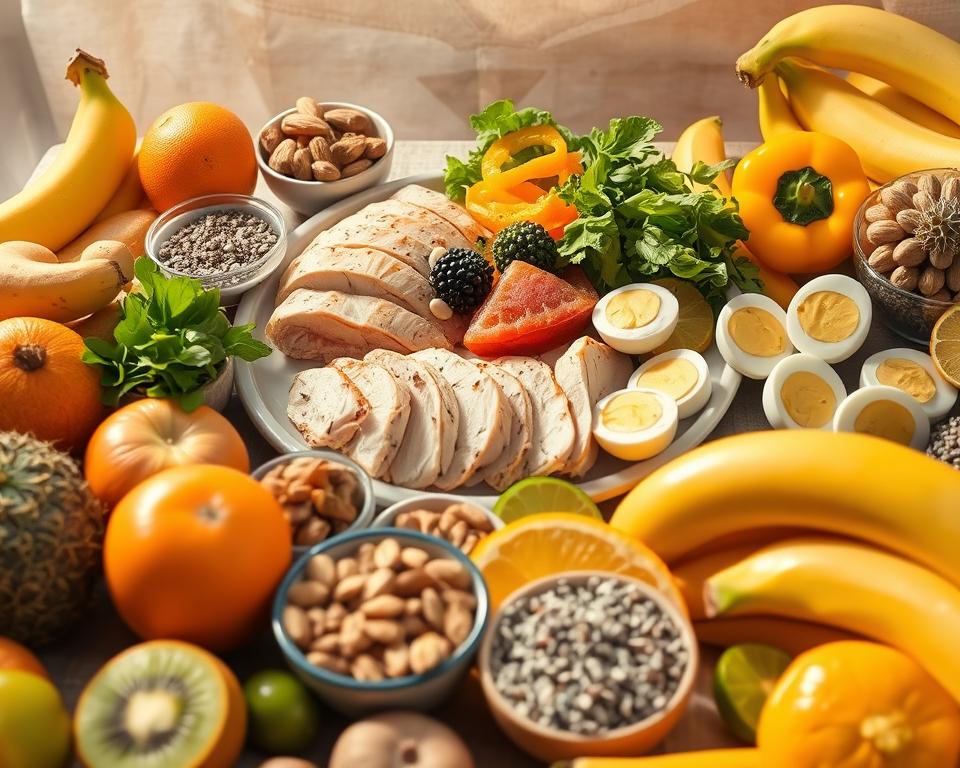Do you wonder if you can stay full of energy as you get older? I’ve thought about this a lot, wanting to stay healthy and active in retirement.
Our energy can change as we age, affecting how we feel. But, I found out that eating the right foods can really help. By choosing the best foods, we can keep our energy up.
Eating the right foods can really help. In this article, I’ll share tips to boost your energy in retirement. Let’s make your golden years amazing.
The Energy Crisis Facing Today’s Retirees
Retirement can bring an unexpected energy crisis. As we get older, our energy goes down. This can get worse if we don’t move much, eat poorly, or have health issues.

Healthy aging means keeping our energy up. Our metabolism slows down with age. We need different foods to stay healthy.
Retirees might not eat as well as they used to. They might skip meals or eat too much junk food. This can make them feel tired.
Changes in diet and body can make energy levels drop. It’s important to eat right and stay active to fight this.
Knowing why we feel tired is key. By eating well and staying active, retirees can boost their energy. This improves their life a lot.
Nutritional Advice to Boost Energy in Retirement: Latest Research
Eating right is key in retirement. I’m excited to share new findings with you. As we get older, our bodies change, affecting our energy. But, research shows some foods can help us feel more alive.
Energy-boosting foods are important for retirees. Eating a variety of whole foods is crucial. Foods like berries and leafy greens fight fatigue.

Lean proteins like chicken, fish, and beans are also good. They have iron, helping our cells get oxygen. This supports our energy. Whole grains like quinoa and brown rice give us lasting energy.
The Mediterranean diet is also good for older adults. It includes whole grains, fruits, veggies, lean proteins, and healthy fats. This diet is balanced and good for energy.
Start small to see changes. Add leafy greens to your meals or switch to whole grains. You’ll likely feel more energetic.
By eating nutrient-rich foods and keeping a balanced diet, you can boost your energy in retirement. Focus on whole foods and a balanced diet.
Understanding Age-Related Metabolic Changes
As we get older, our metabolism changes a lot. This affects how much energy we have. Our basal metabolic rate (BMR) goes down. This means our body needs fewer calories to just stay alive.
This drop in metabolic rate can cause us to gain weight. If we don’t change our diet or exercise, it’s harder to stay the same weight. It’s important to keep muscle mass up with resistance training and enough protein.
Our bodies also change how they handle sugar and insulin as we age. We become less sensitive to insulin. This can make our blood sugar levels go up. It’s key to watch what carbs we eat and choose ones that are good for us.
Knowing about these changes helps us make better choices for staying healthy in retirement. Eating right and staying active can help keep our energy up. For example, regular exercise and the right food can help us stay healthy and full of energy.
By understanding these changes and acting on them, retirees can manage their energy better. This way, they can enjoy a healthier and more lively retirement.
Power-Packed Proteins for Sustained Energy
Retirees need enough protein to stay energetic. As we get older, our bodies change. This includes how we feel and our energy levels.
Protein helps keep muscles strong. With age, we lose muscle. This can make us weaker and less mobile. Eating enough protein helps keep us healthy and moving well.
So, what’s good for retirees? Lean meats like chicken and turkey are great. Fish, like salmon, is full of protein and good for the heart. For plant-based diets, legumes, nuts, and seeds are good protein choices.
Dairy products and eggs are also full of protein. They’re easy to add to meals. For those who can’t get enough protein from food, protein supplements can help.
There are easy ways to eat more protein. Try Greek yogurt and nuts for breakfast. Have a chicken salad for lunch. And eat fish with legumes for dinner. This way, you get protein all day.
By eating more protein, retirees can keep their muscles strong. This helps them stay energetic and enjoy their retirement more.
Complex Carbohydrates: The Steady Energy Solution
Staying active in retirement needs a balanced diet. Complex carbs are key for energy. They have fiber, vitamins, and minerals, making them a healthy choice.
Complex carbs are in whole foods like grains, veggies, and legumes. These foods give energy and important nutrients for health. For example, brown rice, quinoa, and whole-wheat bread are great sources.
Types of Complex Carbohydrates
There are many types of complex carbs for a retirement diet. These include:
1. Whole grains: Brown rice, quinoa, whole-wheat bread, and whole-grain pasta.
I make it easy to add these foods to my diet. I eat oatmeal or whole-grain toast for breakfast. I also add veggies to meals and use legumes in soups and salads.
By eating complex carbs, I keep my energy steady. This helps me stay active in retirement. It also makes me feel better overall.
Essential Fats That Fight Fatigue
Learning about healthy fats can change a lot for retirees wanting more energy. These fats are key in the best nutrition for older adults. They help fight fatigue and keep you healthy.
There are many good fats to know about. Omega-3 fatty acids are in fish like salmon and sardines. They help your heart and give you more energy. You can also find omega-3s in nuts and seeds, like walnuts and chia seeds.
Monounsaturated fats are in avocados and olive oil. They give you energy for a long time. They also help your body use vitamins better. Eating different healthy fats can help you feel less tired and healthier.
Retirees can easily add these fats to their meals. Try putting avocado on toast or oatmeal. Use olive oil in salad dressings. Snack on nuts and seeds too. These small changes can make a big difference in your energy and health.
Vitamins and Minerals: The Micronutrient Connection
Vitamins and minerals are key for keeping energy up, more so for older adults. As we get older, our bodies change. This can make it harder to get and use these important nutrients.
Some vitamins and minerals are super important for energy. For example, Vitamin D is crucial for overall health. Not having enough can lead to feeling tired and weak muscles. Also, B vitamins, like B12, help make energy in cells. Older adults might not get enough B12 from food, so they might need supplements or special foods.
Iron is also very important. It helps carry oxygen to cells, which helps make energy. But, older adults often don’t get enough iron. This can be because they eat less or their bodies don’t absorb it well. Magnesium and potassium are also key for energy. They help muscles work right and keep the body’s metabolism healthy.
To get enough of these nutrients, older adults should eat a balanced diet. This means lots of fruits, veggies, whole grains, lean proteins, and healthy fats. Foods like leafy greens, nuts, and special cereals are great. Sometimes, supplements are needed, but always talk to a doctor first.
Eating foods that boost energy can really help. Knowing how vitamins and minerals work and making smart food choices can help older adults stay full of energy and life.
Hydration Strategies for Enhanced Energy
Drinking water is key for energy, more so in retirement. Our bodies change with age, affecting how we stay hydrated and our energy.
Monitoring Hydration is key. Check your urine color; it should be pale yellow. Dark yellow or amber means you’re dehydrated.
Drink at least eight glasses of water daily. Eat foods like watermelon, cucumbers, and celery too. Increasing fluid intake is easy with small changes, like drinking water with meals.
Other drinks like herbal teas and low-sugar sports drinks help too. But watch out for caffeinated drinks, as they can make you lose water.
Using these hydration strategies daily boosts your energy. It’s a big part of staying healthy in retirement. This advice helps keep you energized and well.
Meal Timing and Energy Management
Knowing when to eat can really help our energy. As we age, it’s key to understand how meal times affect our energy.
Eating at set times keeps our energy steady all day. Eating and snacking at the right times can stop energy drops.
Adding proteins, complex carbs, and healthy fats to meals boosts energy. This mix gives the body what it needs to work well.
Also, paying attention to when we eat helps control hunger and avoid eating too much. This can stop energy crashes. A regular eating schedule helps keep energy up, making life in retirement more lively.
In short, choosing the right times to eat is a simple but powerful way to age well and stay full of energy.
Anti-Inflammatory Foods: The Energy Connection
Exploring diet and energy, I found anti-inflammatory foods are key for seniors. Chronic inflammation is common in older adults. It causes fatigue and lowers energy.
By eating anti-inflammatory foods, seniors can fight inflammation and feel more energetic. Foods rich in omega-3 fatty acids like salmon and walnuts are great. They help reduce body inflammation, boosting energy.
Turmeric is also good. It has curcumin, which fights inflammation and boosts energy.
Other foods like berries, green tea, and dark chocolate are also helpful. They’re full of antioxidants and nutrients that fight inflammation and support health.
Seniors can fight fatigue and boost energy by eating these foods. They’re a big part of a good senior nutrition plan. They help seniors stay energetic and healthy as they age.
Creating Your Energy-Boosting Meal Plan
Now we know about foods that boost energy. It’s time to make a meal plan just for you. This plan will pick the best foods and when to eat them.
First, let’s list the foods that boost energy. These arepower-packed proteinslike lean meats and fish,complex carbohydrateslike whole grains and veggies, andessential fatsin nuts and avocados. Eating these foods can keep your energy up.
To plan your meals, follow these steps:
1. Know Your Dietary Needs: Think about any food limits you have, like no meat or gluten.
2. Choose Meals with Energy-Boosters: Make sure each meal has proteins, carbs, and fats.
3. Eat at the Right Times: Eat meals at regular times to keep your energy steady.
Here’s a simple meal plan to begin with:
– Breakfast: Oatmeal with nuts and fruits, plus orange juice.
– Lunch: Grilled chicken, quinoa, and steamed veggies.
– Snack: Yogurt with berries and almonds.
– Dinner: Baked salmon, sweet potatoes, and green beans.
By following these tips and adding energy-boosting foods to your meals, you can stay full of energy. This will help you feel great in retirement.
Nutrition and Physical Activity: The Perfect Energy Duo
Looking for ways to boost energy in retirement? Mixing nutrition and physical activity is key. A good diet gives your body the fuel it needs. Regular exercise makes sure this fuel is used well.
Boosting Energy through Nutrition: Eating a variety of whole foods is important. Include fruits, veggies, whole grains, lean proteins, and healthy fats. Foods like berries and leafy greens fight oxidative stress, helping you feel more energetic.
The Role of Physical Activity: Exercise does more than burn calories. It also improves heart health, strengthens muscles, and lifts your mood. Try brisk walking, cycling, or swimming. These are great for retirees because they’re easy on the body and fit any fitness level.
When you eat well and exercise often, you get a big energy boost. Adding wellness tips for retirees to your day can make life more lively and full of energy.
Social Aspects of Healthy Eating in Retirement
Retirement has shown me how key social meals are. Sharing food with others can really change our eating habits and health. It makes me want to try new foods and follow dietary recommendations for seniors.
Being part of a group that loves healthy eating has helped me. We share recipes and cooking tips. This makes meals fun and helps me eat right.
Also, eating with others fights loneliness, a big problem in retirement. Meal sharing keeps me connected and motivated to eat well.
Adding social eating to my routine has been great. It boosts my mind and body health.
Conclusion: Your Personal Energy Revolution Starts Today
Retirement can be complex, but staying active is key to feeling good. By following the nutrition tips in this article, you can feel more alive.
Focus on proteins, carbs, fats, and vitamins to make a meal plan that works for you. Adding exercise will boost your energy even more.
Start making these changes today. You’ll be on your way to a healthier, more active retirement. Taking charge of your diet and staying focused will change your energy levels. You’ll live life to the fullest.

